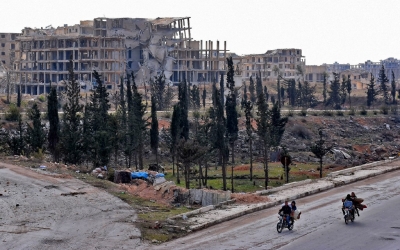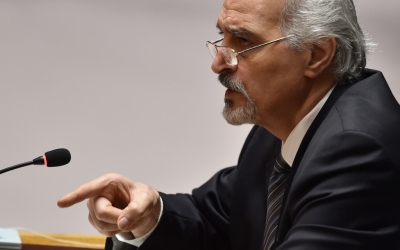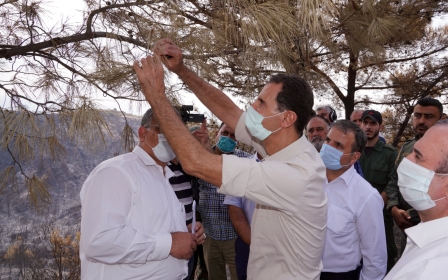'Wise diplomacy': How will Biden tackle US foreign policy towards Syria?

As the tenth anniversary of the Syrian conflict grows near, the question of how the international community should interact with the war-torn nation has come under renewed focus.
While much of President Joe Biden's foreign policy appears to be an extension of US strategy created during his tenure under President Barack Obama, there is little hope of turning back the clock in the case of Syria.
Obama's strategy sought to support the rebels attempting to overthrow Syrian President Bashar al-Assad. But those days are long gone, with much of the international community now coming to a consensus that the leader is here to stay.
'Right now, there's no real risk of the opposition driving Bashar al-Assad from power'
- Jeffrey Feltman, former State Department official
Picking up after former President Donald Trump's convoluted moves in Syria - which confused even some of the world's leading military analysts - will be a challenge for the Biden presidency.
He also faces the prospect of holding President Assad accountable for the Syrian government's well-documented war crimes while moving forward with the likelihood of his continued rule.
New MEE newsletter: Jerusalem Dispatch
Sign up to get the latest insights and analysis on Israel-Palestine, alongside Turkey Unpacked and other MEE newsletters
Currently, severe sanctions put in place by the US Congress via the Caesar Act make up a large share of US involvement in Syria.
With around 900 troops on the ground, who have been mostly stationed around oil reserves, there is also the question of what goal the Biden administration will set regarding continued US military involvement.
What to do about sanctions?
Joshua Landis, the director of the Center for Middle East Studies at the University of Oklahoma and who specialises in Syria, told Middle East Eye that Trump's strategy had been "to turn Syria into a quagmire".
"The end game was to bring about some form of regime change through peaceful means, which is a mishmash of various policies in the past, to make them palatable for today," Landis said. "But they're not realisable."
"Assad fought a very brutal war in order to stay in power and keep his people in power, and he's not going to lose. There is no opposition today that could possibly overthrow him," he continued.
Instead, establishing ties and mending the US relationship with the Assad government should be a priority, Landis said, adding that most US sanctions against Syria should be lifted.
"The economic and isolation measures are really punishing the people rather than the regime. That is a bad policy because it leaves Syria a vacuum, which strengthens Iran and strengthens the regime," he said.
"But I think the United States can get a return on the terrible economic quagmire that it has helped to develop in Syria if it uses wise diplomacy."
Sanctions as a bargaining tool
One of the top diplomats set to help implement US diplomacy in the war-torn nation will be the US envoy to Syria, who has yet to be appointed.
Jeffrey Feltman, a former State Department official and UN diplomat, has reportedly been tapped by US Secretary of State Antony Blinken for the position.
Speaking to MEE, Feltman rejected the idea that US sanctions had played a significant role in the ongoing suffering in Syria.
"One can't deny that the sanctions must have some impact on the civilian population… but the primary cause of serious economic woes is not sanctions; the primary cause is the death and destruction from the war - the majority of which is attributed to the government because it comes from air strikes that the opposition has never had access to," Feltman said.
A critic of the US's policy in Syria thus far - outside of its role in pushing back the Islamic State (IS) group - Feltman said that while sanctions should not be held responsible for the economic situation in Syria, they have also failed to pressure the Assad government.
Going forward, Feltman said he believes the US should use sanctions as a bargaining tool.
"I think that it is time to [put] on the table some kind of step-by-step transactional roadmap that would require the Syrians to take certain steps for political reform, decentralisation, respect for human rights, prisoner releases, what have you," Feltman said.
"In return for verifiable and tangible serious steps [from Syria], the US would also take steps to ease or temporarily suspend the sanctions, and see if easing the sanctions that are in place now could create the type of behaviour changes that the imposition of sanctions themselves did not do," he continued.
"I'm a sceptic, I'm not sure that this would work. But I think it's worth a try," he said.
'A very mixed message'
During a news conference on Tuesday, State Department spokesman Ned Price echoed some of Feltman's sentiments, saying the Biden administration would be looking to promote a multilateral "political settlement" to end the war in Syria. At the same time, he also indicated that it would continue to use sanctions as a pressure tool.
"A political settlement must address the underlying causes that led to nearly a decade of civil war," Price said. "We will use the tools at our disposal, including economic pressure, to push for meaningful reform and accountability."
Still, so far, President Biden's cabinet and staff picks have sent "a very mixed message", Landis said.
Late last month, Biden named Robert Malley, a former Obama administration official and Middle East expert, to be his special envoy for Iran. The choice upset warhawks, who labelled the official as too soft on Tehran and too critical of Israel.
As Iran is set to be one of the administration's top foreign policy concerns, analysts have pointed out the implications nuclear negotiations could have on US policy in Syria.
During his time working in the Obama administration, Malley opposed US support for Syrian rebels and resisted punitive measures against President Assad, as such moves complicated talks with Iran, a key ally of the Syrian government.
In a 2018 interview, Malley criticised Washington's support for the Syrian opposition, saying "we were part of what fueled the conflict rather than stopped it".
While newly sworn-in Secretary of State Blinken agrees that US attempts to support Syrian rebels was a "failed" policy, unlike Malley, he has voiced support for continued punitive measures against the Assad government.
During the Biden campaign, Blinken told the Washington Post that the administration should strongly enforce Caesar Act sanctions.
For its part, the Biden campaign released an Arab American community Plan for Partnership that expressed plans to "mobilize other countries to support Syria's reconstruction", which raised questions about whether Biden intends to fully implement the Caesar Act. The plan also said the administration would "recommit to standing with civil society and pro-democracy partners on the ground".
Russian and Iranian influence
Meanwhile, Feltman pointed out that while the military situation in Syria "is quieter than it's been in a long time", the economic and social conditions have been rapidly deteriorating.
While Russia and Iran came forward to back the Syrian government militarily during the past several years, Feltman is sceptical that such a bailout would be offered in terms of economic relief.
"Right now, there's no real risk of the opposition driving Bashar al-Assad from power. But can he maintain the same type of role he has when he's presiding over economic and social collapse?" Feltman asked.
"And will the Russians and the Iranians bail him out in the same way that they bailed him out on the military front? And how long can they sustain this? It's a very interesting time to be looking at a change in US-Syria policy when the situation on the ground in Syria is no longer so much about a military campaign," he said.
For his part, Landis told MEE that the US is likely to keep its military presence in Syria unchanged. In addition to combatting the IS threat, US troops also provide a means "to cut Iraq off from Syria, and to break Iranian supply lines".
"That policy depends on allowing Israel to have complete dominance over the air, so it can bomb at will and keeping the highways cut between Iraq and Syria, which the US does with its placement of troops at the main highway where almost all the trade went across so that it can stop all economy," Landis said.
"America really - it's got a lot of leverage in being able to destroy the economy of these countries and put pressure on Iran, and it's gonna use that pressure in order to negotiate an Iran deal," he said.
'A giant pipeline?'
Meanwhile, a renegotiated deal with Iran next to a potentially stabilising Syria carries other worries for the United States, as the possibility of greater cohesion across the region could have wider effects that compete with US aspirations, Landis said.
Landis pointed to the prospects of an oil pipeline that could connect Iran, Iraq, Syria and Lebanon, which was being considered in 2011, just before the war in Syria broke out.
While not aligned with US interests, as it would enrich Iran - one of the world's largest oil producers - and compete with proposed pipelines through Saudi Arabia to Israel, such a deal could do wonders for the region. At the same time, it would threaten European reliance on Russian gas as well as Turkish interests.
"[An Iran deal] should allow for the greater normalisation of economic relations, because… for the first time in modern history, the governments of Iran and Iraq, Syria and Lebanon are friendly," Landis said.
"Now they're all aligned. And for Iran, you would want to see a giant pipeline built from Iran, right across the Arabian Desert, between Iraq, Syria, and to the coast that would then send that oil and gas to Europe, avoiding Turkey," Landis continued. "This would be the super-smart thing to do."
Such a pipeline would take time but would bring significant income to Syria and its neighbours.
"This would be good for Europe and it'd be good for Iran and Iraq and Syria - but America is stopping all that by keeping all transit trade stumped by having its troops on the major borders and continuing its sanctions, and you name it - just it's not going to happen," Landis said.
"But in theory, that's what Iran would want, because it would allow it to connect with the world and become a major trading partner and enrich itself and its neighbours, including Syria."
Middle East Eye delivers independent and unrivalled coverage and analysis of the Middle East, North Africa and beyond. To learn more about republishing this content and the associated fees, please fill out this form. More about MEE can be found here.








